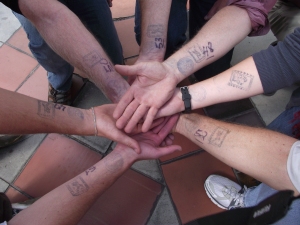 The people of Yana Cocha are a hard working group of indigenous people in the rural Andes. They are considered among the lowest of Ecuador’s social classes and are certainly not used to Westerners coming to visit and help them. Some were cautious at first, but all were gracious and humble.
The people of Yana Cocha are a hard working group of indigenous people in the rural Andes. They are considered among the lowest of Ecuador’s social classes and are certainly not used to Westerners coming to visit and help them. Some were cautious at first, but all were gracious and humble.
They live simply in adobe homes with a smattering of modern conveniences. Nothing is built especially well, but they are proud of what they have and are quite hospitable. The people have a strong sense of community, and came together to welcome us with open arms, big smiles and great enthusiasm! We had an official welcoming as well as many, many unofficial gestures of thanks.
Often forgotten by the government, the indigenous people have been promised help by many different groups over many years; community leaders told us that our group led by Bruce and Cherith was the first to actually come through!
As is the case in much of Central and South America, sanitation is of a major concern. It is necessary to regularly disinfect hands as the people do not utilize the best sanitation practices, and the cleaning and disinfecting of food and water is typically not a priority. When one of the very polite people in the community would greet us with a warm “buenos dios” and shake hands, our hosts would immediately but quietly warn us in quiet English “disinfect your hands”.
Each day from 8:00 a.m. to usually around 1:00 p.m. we would work in the trenches with the community, helping to drain the area where they intended to collect the spring water in a concrete chamber. From there the water would be filtered and pumped to the homes along the hillsides. It was hard, filthy work, and very often we would be bumping into each other as everyone wanted to pitch in but there were often more workers than work. All of the community members were involved and were excellent, enthusiastic workers; some of the women even raked the mud with children strapped to their backs.
The working conditions were not deplorable, just wet, muddy and hard. We saw a few tarantulas working along us, but other than that we did not see any serious insects. (Tarantulas are not as bad as the scorpions we have seen on trips to Mexico and Haiti!)
Initially some of us were a little frustrated with the slow pace and the short days. We were there to work we reasoned, and wanted to accomplish something significant! However, we learned that while Bruce and HCJB designs and leads the effort, it is really a community project and they are to do most of the work. HCJB believes that we should be there providing an example and help, but are not to take over the run the project.
I learned to appreciate and respect this approach, as charity in America has largely been reduced to free gifts of provisions, and not conditional donations of work. Work gives the needy a sense of accomplishment and self-respect that blind donations cannot.
We were also In Yana Cocha to spend time socializing and fellowshipping with other Christians. Every day after work we would make lunch, play with the kids for a couple of hours, and prepare for an evening time of learning and worshipping together.
Food was generally very good, as our missionary hosts provided us with clean, healthy, tasty food! Cherith Rydbeck is a very good cook and had every day’s meal planned before we left Quito. We were discouraged from eating any local food, as again, sanitation and clean food preparation are not the highest priority to the community.
Still, there is a local delicacy known as “cuy” or roasted guinea pig that is served with potatoes and offered to guests. We knew that it was likely going to be offered to us and it would be a major affront to refuse a prized meal from a poor community member. Sure enough, around dinner time one night a large group of people showed up with more than enough servings of cuy and potatoes for all of us. A little gamey and having a taste all its own, I doubt it will catch on in the US.












